As an aquarium enthusiast, I understand the importance of feeding my discus fish a balanced and healthy diet. Many newcomers to the hobby may wonder, “What do discus fish eat?” It’s crucial to offer a variety of foods that meet their nutritional requirements and encourage a vibrant, colorful appearance.
In this comprehensive guide, I’ll share my knowledge and experience on understanding the natural diet of discus fish, what to feed them, and tips for proper feeding techniques. Let’s dive in and explore the ideal diet for your discus fish!
Table of Contents
Key Takeaways:
- A proper diet is essential for the health and vibrancy of discus fish.
- Discus fish require a balanced diet consisting of live foods, frozen foods, pellets, or flakes.
- Supplementation with additional nutrients can be beneficial for discus fish.
- Proper feeding frequency and technique is crucial for optimal fish health.
- Avoid common feeding mistakes that could negatively impact your discus fish.
Understanding the Natural Diet of Discus Fish
As a responsible fish owner, it is important to understand the natural diet of discus fish. In the wild, discus primarily feed on insects, crustaceans, and small aquatic creatures. They may also consume plant matter such as algae and aquatic plants. By replicating their natural diet in your aquarium, you can ensure your discus fish receive the necessary nutrition for optimal health and vibrancy.
Discus fish nutrition is essential for their overall well-being. When planning your discus fish’s diet, consider incorporating a variety of best food for discus fish. This could include live foods, frozen foods, pellets, or flakes.
Live foods can provide valuable nutrients for discus fish. Popular options include brine shrimp, bloodworms, and daphnia. These foods are often available at your local pet store or online.
Frozen foods also offer convenience and nutritional benefits for your fish. Options such as frozen bloodworms, mysis shrimp, and brine shrimp can easily be stored in your freezer and thawed prior to feeding.
Pellets and flakes are convenient options that can provide your fish with a well-balanced diet. Look for high-quality brands that offer the necessary nutrients for discus fish. It is important to avoid overfeeding your fish with pellets and flakes, as this can lead to digestive issues and an unclean tank.
The Natural Diet of Discus Fish: A Summary
By understanding the natural diet of discus fish, you can provide them with the necessary nutrition for optimal health and vibrancy. Offer a variety of live and frozen foods, as well as quality pellets and flakes to ensure your fish receive a balanced diet. Remember to avoid overfeeding and monitor your fish’s health to ensure they thrive in their aquarium environment.
What to Feed Discus Fish
Feeding discus fish a balanced diet is essential for their overall health and color vibrancy. The ideal discus fish diet should consist of live and frozen foods, pellets, and flakes.
Live Foods for Discus Fish
Live foods can be a nutritious addition to your discus fish’s diet. Brine shrimp, bloodworms, and daphnia are popular options. Not only do they provide necessary nutrients, but the movement of the live food can also stimulate your discus to hunt and search for their food.
Frozen Foods for Discus Fish
Frozen foods offer convenience and a variety of options for discus fish nutrition. Frozen bloodworms, mysis shrimp, and brine shrimp are great choices that provide necessary vitamins and minerals for your fish.
Pellets for Discus Fish
Pellets are a balanced option for feeding your discus fish. High-quality pellets like Hikari Bio-Pure are specifically formulated for discus fish and provide necessary nutrients like protein and fiber. Pellets also have the added benefit of not polluting the water as much as live or frozen foods.
Flakes for Discus Fish
Flakes are another popular option for feeding discus fish like New Life Spectrum Discus Formula. However, flakes should not be the primary source of your discus fish’s diet. They tend to float on the surface of the water, which can cause your fish to gulp air and develop intestinal problems. Use flakes as a supplement rather than the main dish.
Supplementing the Diet of Discus Fish
Supplements like garlic, spirulina, and krill oil can provide additional vitamins and minerals to your discus fish’s diet. Garlic is a natural appetite stimulant and antiparasitic, while spirulina promotes growth and boosts the immune system. Krill oil is a great source of omega-3 fatty acids, which can improve overall health.
Remember, it’s essential to vary your discus fish’s diet and feed them a balanced mix of foods. By incorporating different types of live and frozen foods, pellets, and flakes, you can provide the necessary nutrients for their health and well-being.
Live Foods for Discus Fish
Feeding your discus fish live food is a fantastic way to promote natural behavior and good health and helps to maintain a balanced diet. Popular live foods include worms, brine shrimp, and daphnia, so let’s dive into each one to help you decide which is the best option for your fish.
Brine Shrimp
Brine shrimp are a tiny, saltwater crustacean and are a popular live food choice for discus fish. They are high in protein and suitable for any size of the discus fish, commonly known as Artemia nauplii. Brine shrimp are readily available and easy to find, making them an excellent addition to your fish’s diet.
Bloodworms
Bloodworms are the larvae of non-biting midges and are high in protein, making them an excellent food option for discus fish. However, it is important to note that feeding too many bloodworms can cause digestive problems for your fish.
Daphnia
Daphnia is a freshwater crustacean high in protein and is an excellent source of vitamins for your discus fish. It also stimulates your fish’s natural foraging behavior. Daphnia tends to float on the surface of the water, so be sure to wait for their sinking before allowing your fish to eat them.
Live foods should not serve as your diskus fish’s primary diet and should only supplement the other types of food, flake or pellet, for a well-balanced diet. It’s essential to ensure that the live food is fresh and that you’re feeding the right portion sizes as part of your fish care routine.
Frozen Foods for Discus Fish
Frozen foods offer a convenient and nutritious option for feeding your discus fish. These foods remain fresh longer than live ones and come in a variety of options. Popular choices include frozen bloodworms, mysis shrimp, and brine shrimp. Incorporating these frozen foods into your fish’s diet is simple and easy, and the benefits are numerous.
| Frozen Food Type | Nutritional Value | Feeding Frequency |
|---|---|---|
| Frozen Bloodworms | Rich in protein and a great source of vitamins and minerals. | 2-3 times per week |
| Mysis Shrimp | Contain high levels of protein, amino acids, and Omega-3 fatty acids. | 2-3 times per week |
| Brine Shrimp | Contain high levels of protein and amino acids but are lower in Omega-3 fatty acids compared to mysis shrimp. | 2-3 times per week |
Include these frozen foods in your discus fish’s diet to provide a varied and complete mix of nutrients. Remember to thaw the frozen food before feeding, and only offer as much as your fish can consume in a few minutes to avoid overfeeding and water contamination.
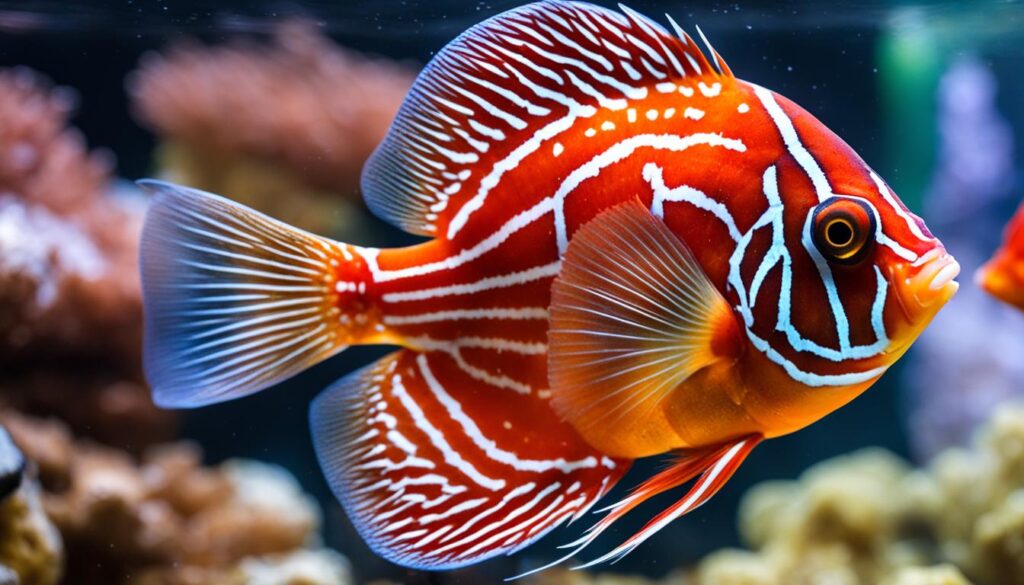
Pellets for Discus Fish
Pellets are a convenient and balanced option for feeding your discus fish. Compared to live or frozen foods, pellets can provide a more consistent and complete diet.
When choosing pellets for your discus fish diet, it’s essential to opt for high-quality brands that offer a balance of protein, vitamins, and minerals. Some of the best pellets for discus fish are:
| Brand | Features |
|---|---|
| TetraCichlid Discus |
|
| Hikari Discus Bio-Gold |
|
| New Life Spectrum Discus Formula |
|
When feeding pellets, make sure not to overfeed your discus fish, as this can lead to bloating and digestive issues. A general rule of thumb is to feed no more than what your fish can consume in 2-3 minutes, two to three times a day.
Flakes for Discus Fish
When it comes to feeding discus fish, flakes are a convenient option that many fish keepers prefer. They are available in a wide variety of brands and types, making it easy to incorporate them into your fish’s diet.
But what are the best flakes for discus fish and how do you choose them?
The most important thing to consider when selecting flakes for your discus fish is their nutritional value. Look for brands that offer a balanced diet, preferably with added vitamins and minerals that are essential for your fish’s health.
Some popular brands of flakes for discus fish include:
| Brand | Key Features |
|---|---|
| TetraMin | Rich in protein and essential vitamins and minerals |
| Hikari Bio-Pure | Freeze-dried to retain maximum nutrition |
| New Life Spectrum | Contains all-natural ingredients for optimal health |
It’s important to note that while flakes can provide a balanced diet for your discus fish, they should not be the sole source of nutrition. It’s recommended to supplement flakes with other types of food like frozen or live foods for a varied and complete diet.
Here are some tips for feeding flakes to your discus fish:
- Feed small amounts of flakes at a time to prevent overfeeding
- Soak flakes in some aquarium water for a few seconds to make them easier for your fish to digest
- Ensure any uneaten flakes are removed from the tank to prevent them from fouling the water
By following these guidelines and choosing high-quality brands, flakes can be an excellent addition to your discus fish’s diet and contribute to their overall health and color vibrancy.
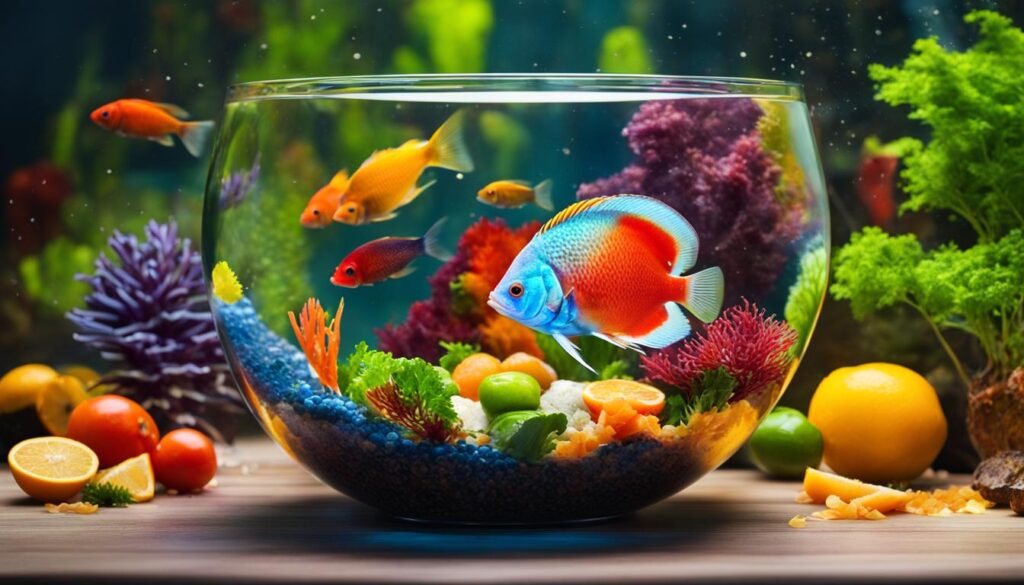
Supplementing the Diet of Discus Fish
While it’s vital to offer your discus fish a balanced diet, their nutrition needs can often go beyond just their food. Numerous supplements can cater to different aspects of discus fish nutrition, such as enhancing the natural vibrant colors or keeping their digestive system in check.
Personally, I have found that supplementing my discus fish’s diet has significantly contributed to their overall health and well-being.
Some of the best food supplements for discus fish include:
| Supplement | Benefits |
|---|---|
| Vitamin and Mineral Supplements | Provide essential vitamins and minerals that may not be present in your fish’s regular diet |
| Probiotic Supplements | Help maintain a healthy digestive system and prevent bloating and other digestive issues |
| Color-Enhancing Supplements | Contain carotenoids and other natural pigments that intensify and enhance your fish’s natural colors |
Remember, adding supplements is not an alternative to providing a balanced diet of live or frozen foods, pellets, or flakes. Instead, it’s a way to enhance their overall well-being and color vibrancy.
Feeding Frequency for Discus Fish
Understanding how often to feed your discus fish is crucial for their overall health and well-being. Overfeeding or underfeeding your fish can lead to various health problems and decreased color vibrancy. The exact feeding requirements for discus fish depend on their age, size, and activity level, but a general guideline for adult discus fish is to feed them twice a day.
It’s essential to monitor your fish’s behavior and adjust their food intake accordingly. If your fish seem bloated or lethargic, consider reducing their food portion or increasing the time between feedings. On the other hand, if your fish appear thin or seem to be constantly searching for food, you may need to increase their food portions or frequency.
When it comes to portion sizes, offer your discus fish enough food that they can consume within 2-3 minutes. Overfeeding can lead to bloating, constipation, and even swim bladder disease. Remember to remove any uneaten food from the tank after feeding to maintain water quality and prevent the buildup of harmful bacteria.
Feeding Schedule for Discus Fish
Here’s a sample feeding schedule you can follow for your discus fish:
| Time | Food Type | Portion Size |
|---|---|---|
| Morning | Pellets or Flakes | Small pinch |
| Evening | Live or Frozen Foods | 1-2 pieces |
Remember to adjust this schedule based on your discus fish’s behavior and nutritional needs.
Tips for Proper Feeding Techniques
Feeding your discus fish is not just about tossing in some food and walking away. To ensure their health and longevity, you need to follow proper feeding techniques. Here are some tips to help you:
- Monitor Water Conditions: Before feeding, make sure your aquarium’s water conditions are within the acceptable range. Poor water quality can affect your discus fish’s appetite and digestion.
- Avoid Overfeeding: Overfeeding can lead to health problems such as obesity and poor water quality. Only feed your discus fish the amount they can consume in about two to three minutes, twice a day.
- Provide a Variety of Foods: Giving your discus fish a varied diet ensures they get the nutrients they need. Mix up live, frozen foods, and pellets or flakes to provide a balanced diet. However, be careful not to exceed their daily feeding amount.
- Feed Consistently: Feed your discus fish at the same time every day to establish a consistent feeding routine. Consistency helps them develop healthy eating habits and aids in digestion.
By following these tips, you can maintain a healthy feeding routine and promote the health of your discus fish. Remember to always pay attention to their behavior and adjust accordingly.
Common Feeding Mistakes to Avoid
Feeding your discus fish is an essential part of their care, but there are common feeding mistakes to avoid that could negatively impact their health and wellbeing. It’s important to provide a balanced diet that meets their nutritional needs while also avoiding these missteps:
- Overfeeding: Providing too much food can lead to obesity, bloating, and poor water quality in your discus fish’s environment.
- Feeding the wrong foods: Not all foods are suitable for discus fish, and some can even be harmful to their health. Avoid feeding food that has not been properly prepared or food that has expired.
- Not providing enough variety: Offering only one type of food can lead to nutritional deficiencies and a lack of variety in their diet.
- Not supplementing their diet: While a balanced diet is important, supplements can help ensure your discus fish receive all the necessary nutrients for optimal health.
By avoiding these common feeding mistakes, you can provide the best care for your discus fish and help them thrive.
Conclusion
In conclusion, I hope this guide has helped you better understand the dietary needs of your discus fish. Providing a balanced diet that includes live foods, frozen foods, pellets, or flakes, depending on your fish’s preferences, is essential for maintaining their health and color vibrancy.
Remember to supplement their diet as needed, monitor feeding frequency, and portion sizes to avoid overfeeding. Proper feeding techniques such as offering food in small amounts and removing uneaten food can help keep your aquarium clean and healthy.
By following these guidelines and avoiding common feeding mistakes, you can provide the best care for your discus fish and enjoy their beauty in your aquarium for years to come.
FAQ
What do discus fish eat?
Discus fish have a varied diet in the wild, consisting of insects, small crustaceans, worms, and plant matter. In captivity, they can be fed a combination of live foods, frozen foods, pellets, and flakes to meet their nutritional needs.
What is the best food for discus fish?
The best food for discus fish is a balanced diet that includes a variety of live foods, frozen foods, pellets, and flakes. This ensures they receive the necessary nutrients for optimal health and vibrant colors.
What are the feeding requirements for discus fish?
Discus fish should be fed multiple times a day, with small portions each time. It’s important to monitor water conditions and avoid overfeeding, as discus fish are prone to digestive issues.
What are the benefits of live foods for discus fish?
Live foods such as brine shrimp, bloodworms, and daphnia offer essential nutrients and can help replicate a discus fish’s natural diet. They can enhance their coloration, stimulate natural behaviors, and provide mental stimulation.
How can frozen foods benefit discus fish?
Frozen foods like bloodworms, mysis shrimp, and brine shrimp are convenient and nutritious options for discus fish. They are easy to store and provide essential proteins and vitamins.
Are there specific pellet brands for discus fish?
Yes, there are specialized pellet brands for discus fish that cater to their nutritional needs. Look for high-quality brands that offer a balanced diet and contain real ingredients.
What types of flakes are suitable for discus fish?
Flakes formulated specifically for discus fish are available in the market. Look for flakes that contain high-quality proteins and are rich in essential vitamins and minerals.
Should I supplement the diet of my discus fish?
While a balanced diet is important, it can be beneficial to supplement your discus fish’s diet with additional nutrients. Supplements like vitamin-rich foods or specialized discus fish supplements can enhance their overall health.
How often should I feed my discus fish?
Discus fish should be fed small portions multiple times a day to mimic their natural feeding behavior. Feed them as much as they can consume within a few minutes, and be mindful of the water conditions to avoid overfeeding.
What are some tips for proper feeding techniques for discus fish?
Monitor water conditions regularly, offer a variety of foods to ensure a balanced diet, and feed them small portions multiple times a day. Avoid overfeeding and remove any uneaten food after feeding to maintain water quality.
What are some common feeding mistakes to avoid for discus fish?
Avoid overfeeding, as discus fish are prone to digestive issues. Also, be cautious of poor food choices that may lack proper nutrition. Lastly, do not leave uneaten food in the tank, as it can lead to water contamination.
References
The International Discus Association (IDA)
The Discus World International (DWI)
Please also check out other articles on this website like:
Master Breeding Techniques for Angelfish – A Guide for Hobbyists
Complete Guide to Plecostomus Tank Size: Tips and Advice
Simple Guide to Easy-to-Care-for Aquarium Plants
Discover the Diverse Corydoras Catfish Varieties- A Guide
Get to Know Various Types of Algae Eaters
Master Guide: Best Water Parameters for Goldfish Care 2023-24
Mastering Black Ghost Knife Fish Care: A Comprehensive Guide
Optimal pH Levels for Tropical Fish: Essential Aquarium Guide
Discovering Freshwater Snail Species: An In-depth Guide
Expert Tips for Breeding Guppies: Keys to Successful Fishkeeping
Discover Peaceful Community Fish: Your Guide to Calm Aquatics
Ultimate Guide to Live Food for Betta Fish — Healthy Choices
Complete Guide to Your Perfect Cichlid Tank Setup
Essential Guide to Discus Fish Care: Help Your Pets Thrive!
Grow Your Own Eden: Beginner-Friendly Aquascaping Plants Guide
Perfect Neon Tetra Tank Mates: Guide to Aquarium Harmony
Product Review of Eheim Classic vs Professional
The Ultimate Guide to Discus Fish Care
What Fish Can Live With Discus?
Ideal pH for Discus Fish | Aquarium Water Guide
How to Sex Discus Fish?: A Simple Guide for Hobbyists
Complete Discus Fish Tank Setup Guide
Can Discus Fish Live With Angelfish? The Complete Guide
I am a passionate aquarist with over 30 years of hands-on experience in fishkeeping. My journey began at a young age, collecting fish from the wild and learning through experimentation. Specializing in tropical fish, I bring a deep understanding of the hobby to FishKeepingMadeSimple. The site provides honest, detailed reviews of essential products and accessories to help fellow enthusiasts create the best environments for their fish.
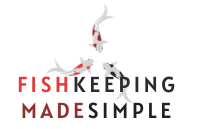
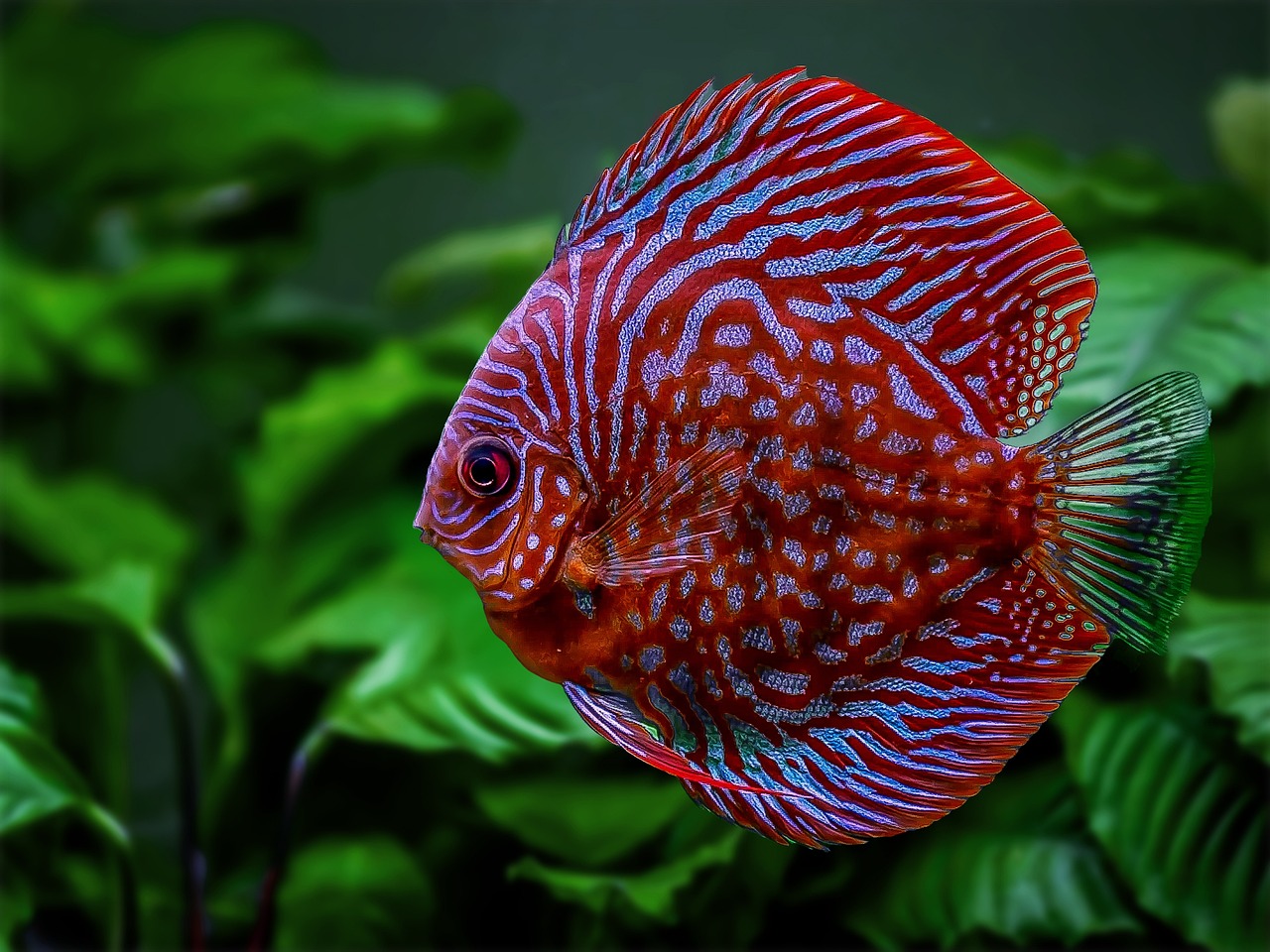
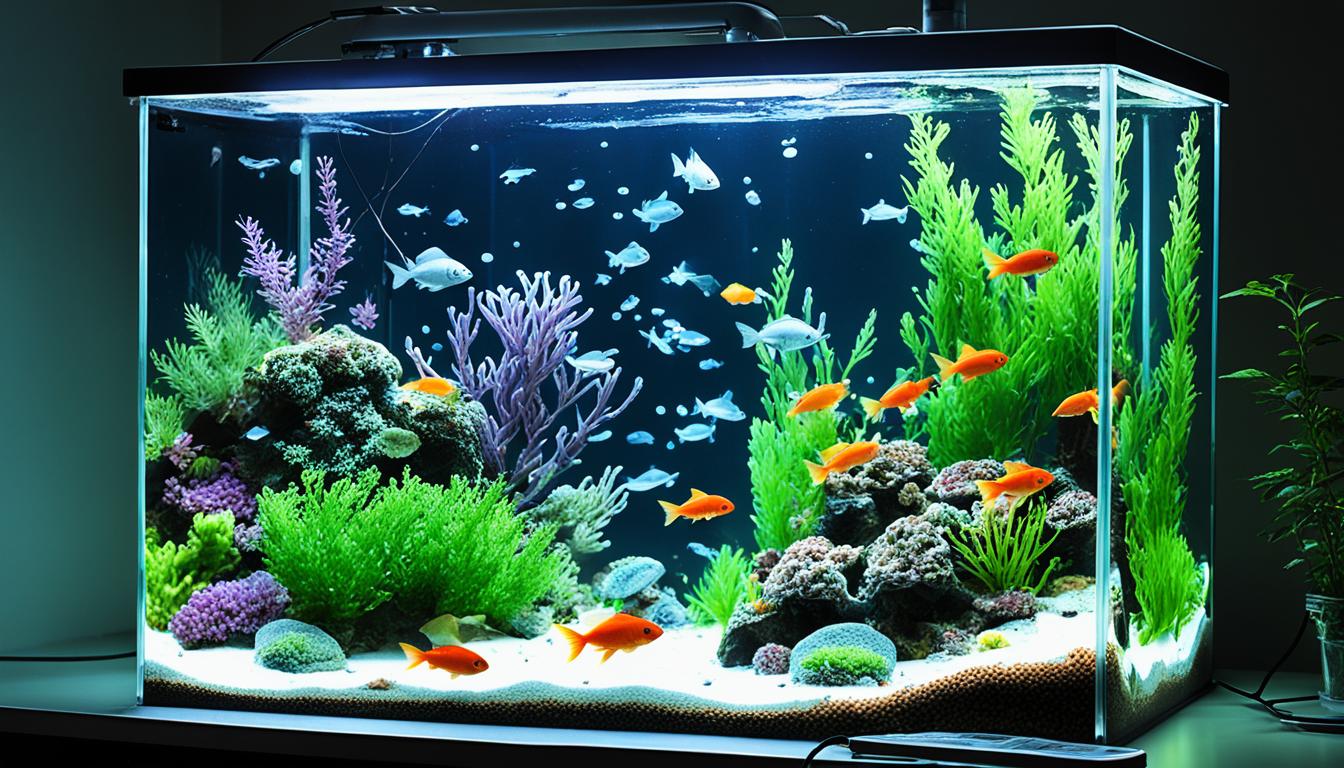
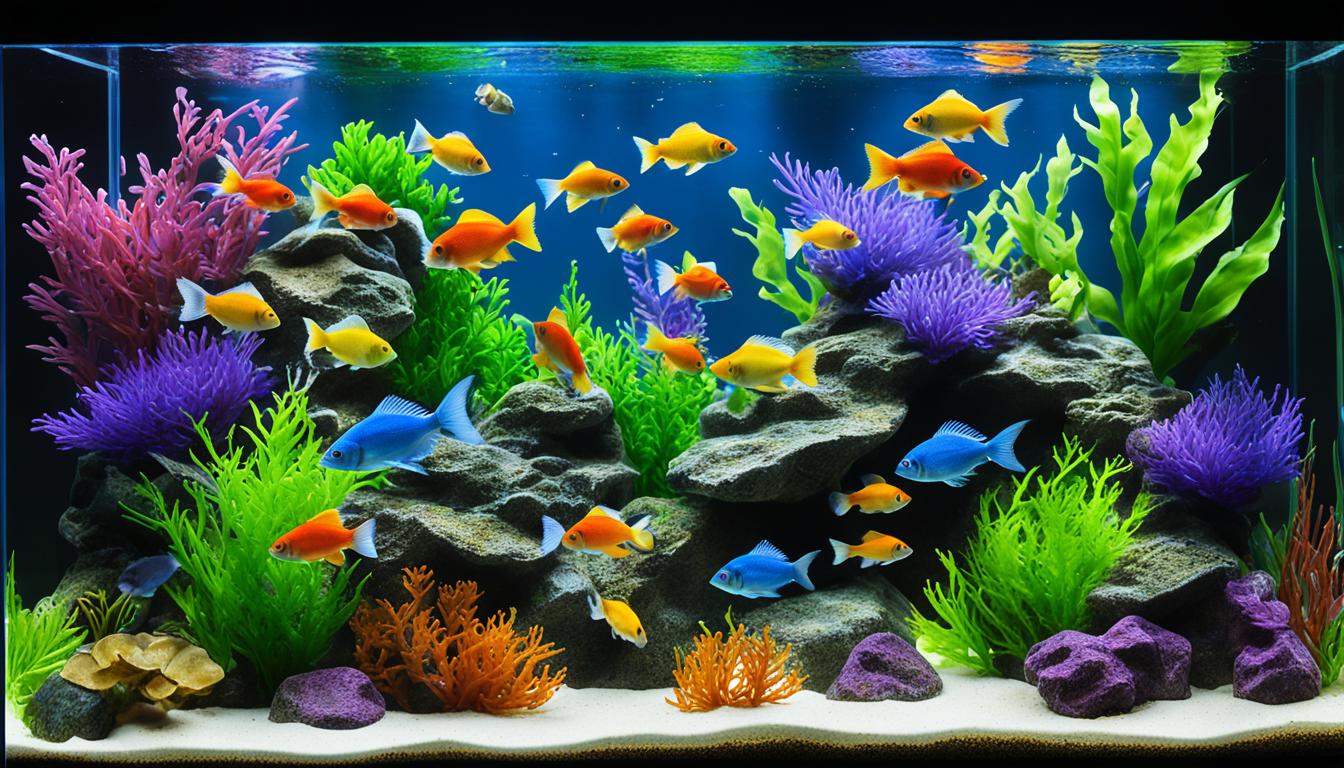
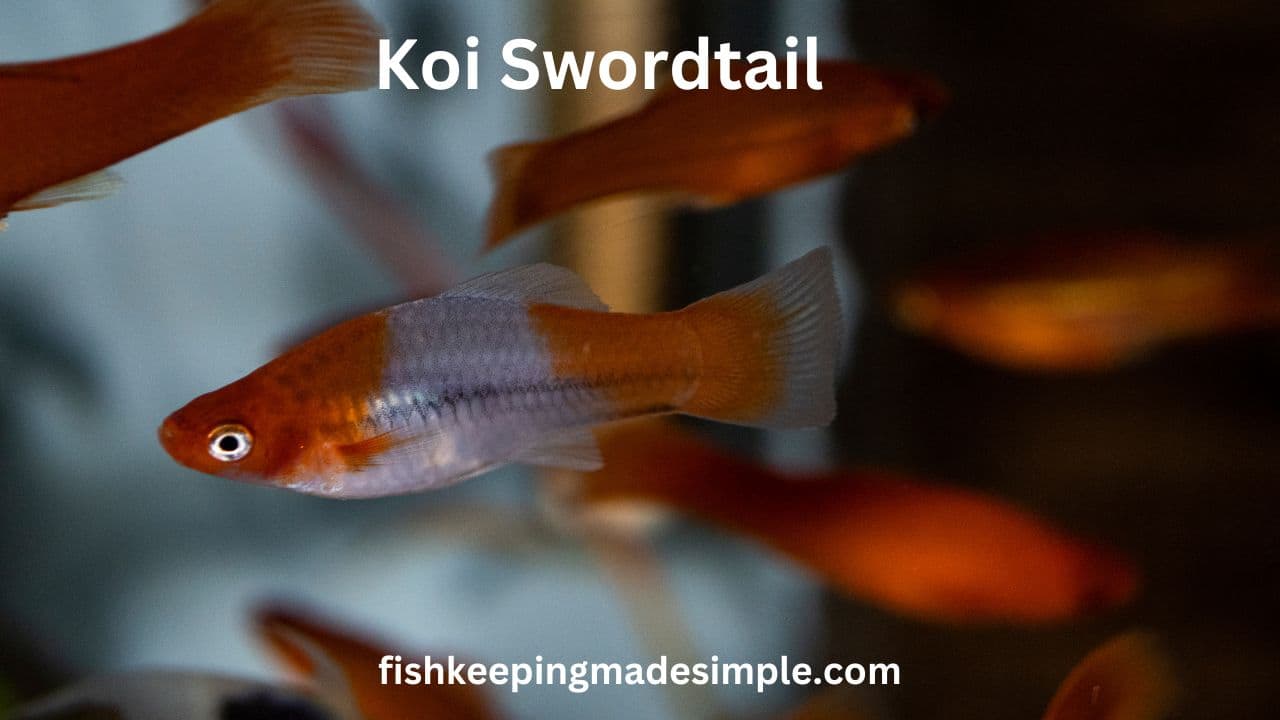

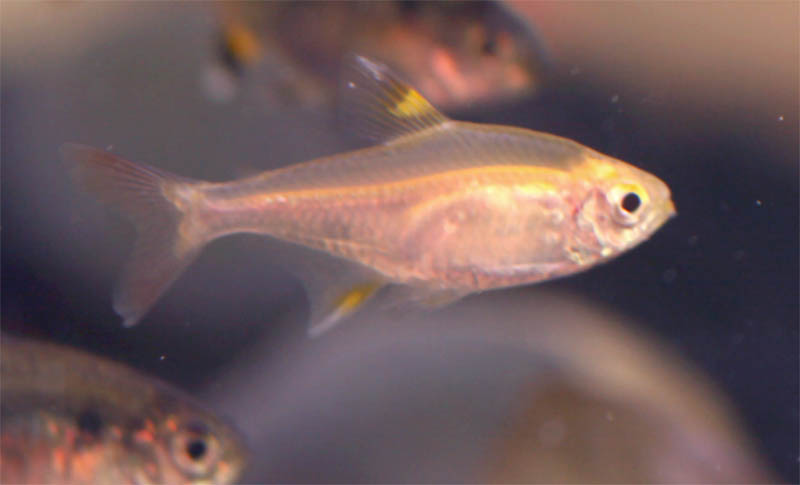
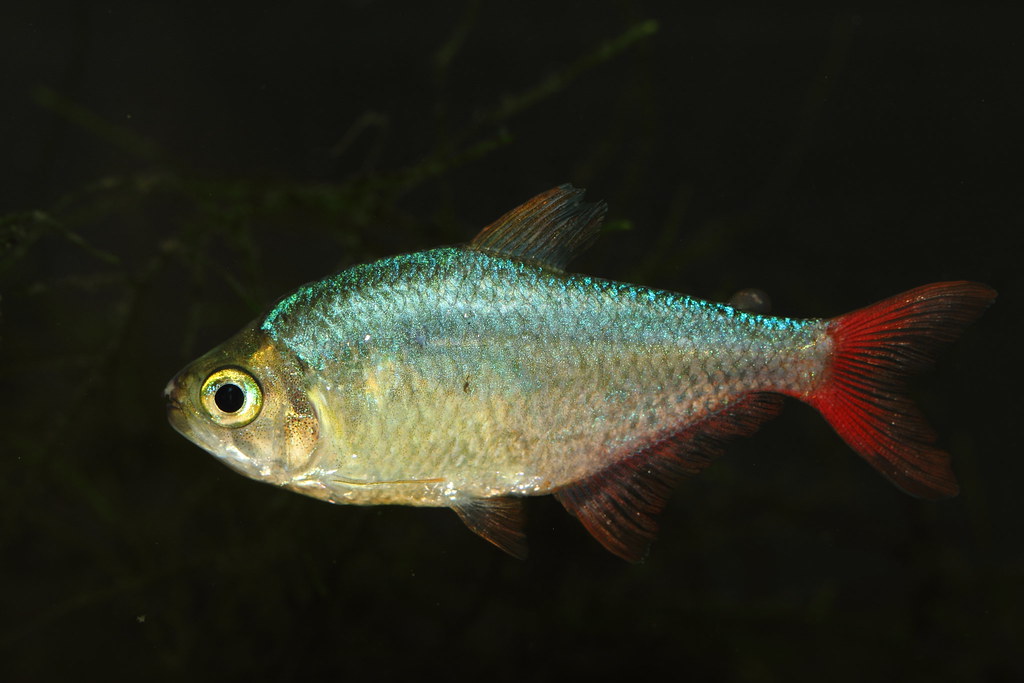
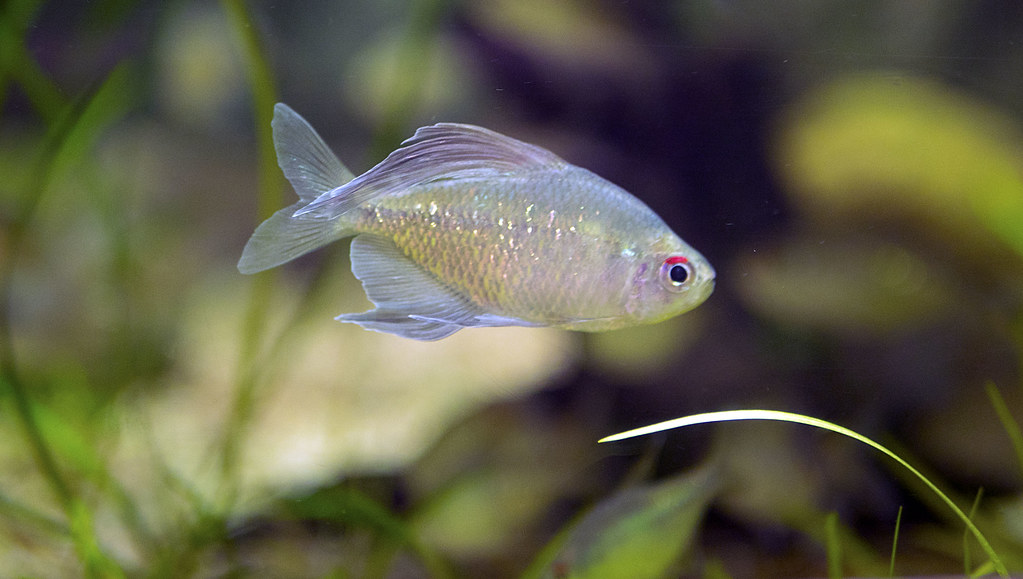
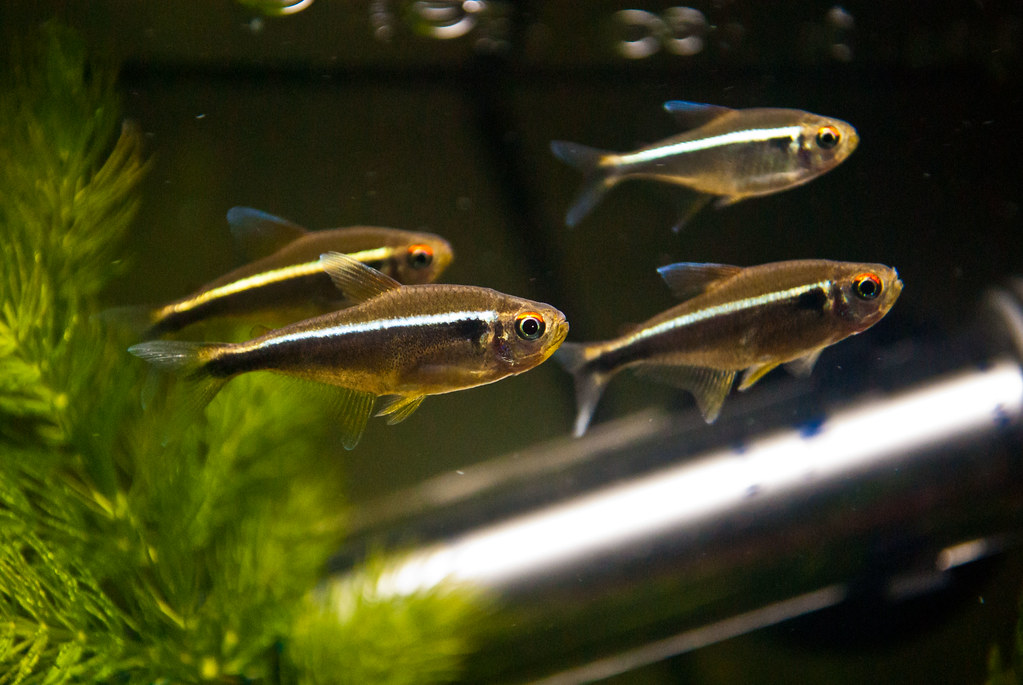
[…] will explore whether plecos eat fish and under what circumstances they may do so. Understanding their feeding habits is essential for […]
[…] Glass Fish require a balanced diet and specific feeding habits for optimal […]
[…] Blue Rams, or Mikrogeophagus ramirezi, are a kind of dwarf cichlid from South America. They come from the Orinoco River area in Colombia and Venezuela. People love […]
[…] to eat. This supports their growth in their early weeks. I keep the baby shrimp safe by not adding fish that might eat them in the tank. Also, I change a small bit of water, 15%, twice a week, but I’m careful not […]
[…] blue rams (Mikrogeophagus ramirezi) are peaceful, stunning fish from the cichlid family. They flaunt vibrant colors like yellow, red, blue, and orange. This makes them a top pick […]
[…] Flakes and Pellets: High-quality fish flakes and pellets can also be included in their diet. Look for products that are suitable for bottom feeders and have a good mix of proteins and plant matter. […]
[…] may cause digestive issues and pollute the tank. Ensure you monitor feeding habits and adjust the diet accordingly based on the fish’s activity […]
[…] maintaining a proper diet is essential for the overall health and vitality of your Balloon Molly fish. Ensure you provide a variety of foods, feed them in appropriate portions, and maintain good […]
[…] Dwarf Cichlids […]